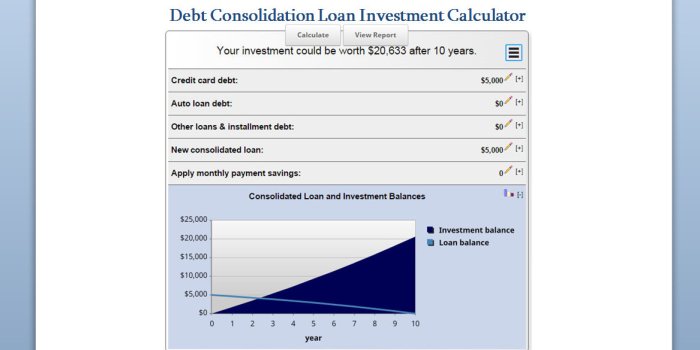Consolidation Loans serve as a strategic financial tool designed to streamline debt management by combining multiple debts into a single loan. This approach not only simplifies repayment but can also potentially reduce monthly payments and interest rates, making it an appealing option for many borrowers. Understanding the nuances of consolidation loans can empower individuals to make informed financial decisions and regain control over their financial futures.
This article will delve into various aspects of consolidation loans, including their types, eligibility criteria, application processes, and the associated pros and cons. Additionally, we will explore how these loans impact credit scores and discuss alternative debt management options to provide a well-rounded perspective on the subject.
Overview of Consolidation Loans

Source: debthunch.com
Consolidation loans serve as a financial tool designed to simplify debt management for individuals and businesses alike. By combining multiple debts into a single loan, borrowers can streamline their payments and potentially secure better interest rates. This approach not only reduces the number of monthly payments but can also alleviate some of the stress associated with managing various creditors.
Consolidation loans come in several forms, each catering to different financial situations and needs. The most common types include personal loans, student loan consolidation, and mortgage refinancing. Personal loans are typically unsecured and provided by banks or credit unions, allowing borrowers to pay off high-interest debts. Student loan consolidation enables graduates to combine federal or private student loans into one, often with extended repayment terms.
Mortgage refinancing allows homeowners to consolidate existing mortgage debt while potentially obtaining a lower interest rate.
Benefits of Using Consolidation Loans for Debt Management
Utilizing consolidation loans can offer numerous advantages for individuals looking to manage their debt effectively. These benefits can significantly impact one’s financial health and provide easier paths to debt freedom. Key benefits include:
- Simplified Payments: With multiple debts consolidated into one loan, borrowers only need to make a single monthly payment, which reduces the risk of missing payments or incurring late fees.
- Lower Interest Rates: Consolidation loans often feature lower interest rates than those associated with credit cards or other high-interest debts, leading to potential savings over time.
- Improved Cash Flow: A lower monthly payment resulting from consolidation can free up additional cash for other essential expenses or savings.
- Structured Repayment Plans: Consolidation loans typically come with clear and structured repayment plans, which can help borrowers stay on track and avoid default.
- Potential Credit Score Improvement: By reducing the total amount of outstanding debt and making consistent payments, borrowers may see an improvement in their credit scores over time.
“Consolidation loans can act as a lifeline for those overwhelmed by debt, offering a strategic way to regain control of finances.”
Eligibility Criteria for Consolidation Loans
To qualify for a consolidation loan, borrowers must meet specific eligibility criteria that lenders typically establish. Understanding these requirements is crucial for potential applicants to prepare adequately and increase their chances of approval.One of the primary factors influencing eligibility for consolidation loans is the borrower’s credit score. Lenders often consider credit scores to assess an applicant’s creditworthiness, which significantly impacts not only eligibility but also the interest rates offered.
A higher credit score generally indicates a lower risk for lenders, potentially leading to more favorable loan terms.
Typical Requirements for Borrowers
Several key requirements are standard in the approval process for consolidation loans. Meeting these criteria can greatly enhance the likelihood of securing a loan.
- Credit Score: Most lenders require a minimum credit score, typically ranging from 620 to 640, although some may consider scores as low as 580.
- Income Verification: Consistent and verifiable income is essential. Borrowers may need to provide pay stubs, tax returns, or bank statements to demonstrate their ability to repay the loan.
- Debt-to-Income Ratio: A ratio lower than 43% is often preferred, which indicates that borrowers manage their debts well relative to their income.
- Loan Purpose: Borrowers must clearly define the purpose of the consolidation loan, typically aimed at paying off existing debts rather than for non-essential expenses.
- Employment History: A stable employment history, usually for at least two years, can improve a borrower’s credibility and eligibility.
Impact of Credit Scores on Interest Rates
Credit scores play a pivotal role in determining not only the eligibility for a consolidation loan but also the corresponding interest rates.
“A higher credit score often leads to lower interest rates, making debt repayment more manageable.”
Lenders often use credit scores to assess risk. For instance, borrowers with a credit score above 740 may qualify for the most competitive interest rates, while those with scores in the 600s may face higher rates or additional fees.
Necessary Documentation for Application
Preparing the right documentation is essential when applying for a consolidation loan. Lenders typically request various forms of information to assess an applicant’s financial situation thoroughly.The following documents are commonly required:
- Identification: A government-issued ID such as a driver’s license or passport to verify identity.
- Proof of Income: Recent pay stubs or tax returns to confirm income stability.
- Credit Report: A detailed credit report may be requested, allowing lenders to evaluate the applicant’s credit history and score.
- Debt Statements: Current statements from all debts to be consolidated, which Artikel the amounts owed and the creditors involved.
- Bank Statements: Recent bank statements to provide a full picture of the applicant’s financial situation.
Application Process for Consolidation Loans
The application process for consolidation loans is a crucial step that enables borrowers to combine multiple debts into a single loan, simplifying repayment. Understanding each phase of this process can help ensure a smooth and successful application.The application process typically involves several key steps that a borrower must follow to secure a consolidation loan. Familiarity with these steps and the required documentation will enhance the chances of obtaining approval in a timely manner.
Step-by-Step Process of Applying for a Consolidation Loan
To facilitate a streamlined application, borrowers should understand the following essential steps:
1. Research Lenders
Begin by researching various lenders to find the most favorable terms and interest rates. This can include banks, credit unions, or online lenders.
2. Pre-Qualification
Many lenders offer a pre-qualification process that allows borrowers to see potential loan amounts and rates without affecting their credit score.
3. Gather Necessary Documentation
Collect all required information and documents prior to applying to expedite the process.
4. Complete the Application
Fill out the loan application thoroughly, providing accurate information regarding income, debts, and credit history.
5. Submit Application
Submit the application along with any required documentation as specified by the lender.
6. Review and Approval
The lender will review the application, which may involve a credit check, and notify the borrower of approval or denial.
7. Loan Agreement
If approved, review the loan agreement carefully before signing to ensure that all terms are acceptable.
8. Fund Disbursement
After signing the agreement, the funds are typically disbursed to pay off existing debts, completing the process.
Checklist of Information and Documents Required for the Application
Having the necessary information and documents ready will streamline the application process. Borrowers should prepare the following:
Personal Information
Full name, address, and Social Security number.
Employment Information
Current employer details and income verification (such as pay stubs or tax returns).
Debt Information
A list of current debts, including account numbers and balances.
Credit Score
Knowing your credit score can help in negotiating better loan terms.
Bank Statements
Recent bank statements to verify financial stability.This checklist ensures that all relevant documentation is at hand, reducing the likelihood of delays in processing the application.
Timeline from Application to Approval
Understanding the expected timeline for a consolidation loan can help borrowers manage their financial plans effectively. The following Artikels a typical timeline:
Application Submission to Review
This process can take anywhere from a few hours to a few days, depending on the lender’s efficiency.
Approval Process
Once the application is under review, borrowers can expect a response within 3 to 10 business days.
Loan Agreement Review
After approval, borrowers usually have 1 to 3 days to review and sign the loan agreement.
Disbursement of Funds
Upon signing, funds may be disbursed within 1 to 5 business days, completing the transition to a consolidated loan.By being aware of this timeline, borrowers can plan their finances accordingly and alleviate the stress associated with repayment of multiple debts.
Pros and Cons of Consolidation Loans
Consolidation loans can be a useful financial tool for individuals seeking to manage their debts more effectively. However, like any financial product, they come with both advantages and disadvantages. Understanding these aspects can help borrowers make informed decisions tailored to their personal financial situations.
Advantages of Consolidation Loans
Consolidation loans offer several benefits that can significantly enhance an individual’s financial management. These advantages include simplified payments, lower interest rates, and improved credit scores. Below are key benefits to consider:
- Simplified Payments: Borrowers can consolidate multiple debts into one single payment, reducing the mental burden of tracking various due dates and amounts.
- Lower Interest Rates: Many consolidation loans offer lower interest rates than those associated with credit cards or other unsecured debts, which can lead to substantial savings over time.
- Improved Credit Score: By consolidating debts and making consistent payments, individuals may see an improvement in their credit scores as their credit utilization ratio decreases.
- Fixed Payment Plans: Many consolidation loans come with fixed interest rates, ensuring that monthly payments remain consistent throughout the loan term.
Disadvantages of Consolidation Loans
While consolidation loans have their merits, it is essential to also recognize the potential drawbacks. Borrowers should be aware of the following disadvantages:
- Longer Repayment Terms: Consolidation loans often extend the repayment period, which can lead to paying more in interest over the life of the loan.
- Risk of Accumulating More Debt: Without proper financial discipline, individuals may find themselves accruing new debts while still repaying their consolidation loan.
- Fees and Charges: Some consolidation loans come with fees that may offset the savings achieved through lower interest rates.
- Impact on Credit Scores: The initial application for a consolidation loan may lead to a hard inquiry on credit reports, which can temporarily lower credit scores.
Situations Where Consolidation Loans are Beneficial
Consolidation loans can be particularly advantageous in specific circumstances. For instance, individuals with high-interest credit card debt can benefit significantly from consolidating into a lower-interest loan. Another example is recent graduates with multiple student loans, as consolidation can simplify repayment and potentially lower monthly payments. These scenarios illustrate how consolidation can be beneficial in managing and reducing financial stress.
Situations Where Consolidation Loans May Not Be Ideal
Conversely, there are situations where consolidation loans may not be the best option. For example, individuals with low credit scores may not qualify for favorable interest rates, thus negating the benefits of consolidation. Furthermore, those who struggle with budgeting or financial discipline might find themselves in a worse situation by consolidating debts, as it could lead to increased borrowing and further financial strain.
Potential Risks Associated with Consolidating Debts
Consolidation loans are not without risks. Borrowers should be aware of the following potential risks:
- Overconfidence in Financial Management: Some individuals may underestimate the habits that led them to debt in the first place, which can lead to repeated financial mistakes.
- Potential Loss of Assets: Secured loans require collateral; thus, failing to repay could result in losing valuable assets.
- Dependency on Credit: Relying on consolidation as a primary debt solution may encourage a cycle of debt, rather than addressing underlying financial issues.
Interest Rates and Fees
When considering consolidation loans, understanding the associated interest rates and fees is essential for making informed financial decisions. These elements can significantly influence the total cost of borrowing and the long-term implications for your financial health. This section delineates the factors determining interest rates, the types of fees that may accompany these loans, and provides a comparative analysis of interest rates based on credit scores and loan amounts.
Determination of Interest Rates
The interest rates for consolidation loans are primarily influenced by several key factors. Lenders assess creditworthiness, which includes evaluating the borrower’s credit score, debt-to-income ratio, and overall financial history. Borrowers with higher credit scores are typically offered lower interest rates, reflecting their perceived lower risk to lenders. Additionally, the economic environment, prevailing market interest rates, and the type of loan (secured or unsecured) also play crucial roles in determining the final interest rate.
The interest rate may be fixed or variable, with fixed rates remaining constant throughout the loan term, while variable rates can fluctuate based on market conditions.
Fees Associated with Consolidation Loans
Various fees may be associated with consolidation loans, which can add to the overall cost of borrowing. It is crucial for borrowers to be aware of these potential fees to avoid unexpected charges. Common fees include application fees, origination fees, and prepayment penalties. The following list Artikels typical fees associated with consolidation loans:
- Application Fees: A one-time fee charged by lenders when processing the loan application.
- Origination Fees: Fees that lenders charge for evaluating and preparing your loan, typically expressed as a percentage of the total loan amount.
- Late Payment Fees: Charges incurred if payments are not made on time, which can add significantly to the total repayment amount.
- Prepayment Penalties: Some lenders impose fees if the borrower pays off the loan early, which can deter early repayment.
Interest Rates Based on Credit Scores and Loan Amounts
To give a clearer understanding of how interest rates vary with credit scores and loan amounts, the following table illustrates different interest rate brackets:
| Credit Score Range | Loan Amount | Interest Rate |
|---|---|---|
| 300-579 | $5,000 – $10,000 | 12% – 20% |
| 580-669 | $10,001 – $20,000 | 8% – 15% |
| 670-739 | $20,001 – $30,000 | 6% – 12% |
| 740 and above | $30,001 and above | 4% – 8% |
This table highlights that borrowers with excellent credit scores can access significantly lower interest rates, which can lead to substantial savings over the life of the loan. Understanding these dynamics empowers borrowers to make strategic decisions when considering consolidation loans.
Impact on Credit Score
Taking out a consolidation loan can significantly influence a borrower’s credit score, both positively and negatively. Understanding this impact is crucial for borrowers looking to improve their financial standing while managing existing debt. A consolidation loan typically combines multiple debts into a single loan with the aim of achieving lower monthly payments and a more manageable repayment plan.One immediate effect of applying for a consolidation loan is the potential dip in the credit score resulting from a hard inquiry performed by lenders.
This inquiry can temporarily lower a credit score by a few points. However, the long-term effects of responsibly managing a consolidation loan can lead to a substantial improvement in creditworthiness.
Strategies for Maintaining or Improving Credit Scores After Consolidation
To ensure a positive trajectory for credit scores post-consolidation, borrowers can employ several effective strategies. It is essential to adopt sound financial habits that not only maintain but also enhance credit scores over time.
- On-time Payments: Consistently making payments on time is pivotal. Late payments can severely impact credit scores, whereas a history of timely payments can help build a positive credit profile.
- Monitor Credit Reports: Regularly checking credit reports allows borrowers to identify any discrepancies or errors that may negatively affect their score. Disputing inaccuracies promptly can lead to corrections and improvements.
- Reduce Credit Utilization: Keeping credit utilization below 30% of available credit limits can enhance credit scores. Paying down existing debts can contribute to a lower utilization rate, positively affecting overall credit health.
- Avoid New Debt: Post-consolidation, it is advisable to avoid accumulating new debts until the consolidation loan is managed effectively. This helps in maintaining a stable credit profile.
Long-term Effects of Consolidation on Credit History
The long-term effects of consolidation on credit history can be significant, especially when managed correctly. Consolidation loans often lead to a more streamlined repayment process, ultimately aiding borrowers in maintaining a healthy credit history.Positive long-term effects include:
- Debt Reduction: Successfully paying off multiple debts through a consolidation loan reduces the total amount owed, which reflects positively on the credit history.
- Improved Credit Mix: Having a variety of credit types (installment loans, credit cards, etc.) can positively influence credit scores. A consolidation loan adds to this variety when managed well.
- Increased Credit Age: Maintaining older accounts while managing a new consolidation loan can enhance the average age of credit accounts, positively impacting credit scores.
Additionally, it is important to acknowledge that while consolidation can be beneficial, failure to adhere to the terms of the loan can lead to adverse effects on credit scores, making timely management essential for long-term success.
Alternatives to Consolidation Loans

Source: com.au
There are several alternatives available for individuals seeking to manage their debt effectively without resorting to consolidation loans. Each option has its unique features, benefits, and drawbacks that should be carefully considered based on individual financial circumstances.One significant alternative to consolidation loans is debt settlement. This process involves negotiating with creditors to reduce the overall amount owed. Credit counseling services also provide valuable assistance in managing debt.
These services offer guidance and education on budgeting, financial management, and debt reduction strategies.
Debt Settlement
Debt settlement can be a viable option for those who are struggling to make payments on multiple debts. In this approach, a debtor may work with a settlement company to negotiate a lower total balance with creditors, often resolving the debt for less than the total owed.The following points summarize the pros and cons of debt settlement:Pros:
- Potential for significant savings on total debt.
- Can provide a faster resolution than other methods.
- Offers an opportunity to settle debts for less than what is owed.
Cons:
- May negatively impact credit score during the negotiation process.
- Creditors may refuse to negotiate.
- There can be fees associated with using settlement services.
Credit Counseling Services
Credit counseling services offer a structured approach to managing debt through education and financial planning. Counselors work with clients to develop budgets, establish payment plans, and negotiate with creditors on their behalf.The following points Artikel the advantages and disadvantages of credit counseling services:Pros:
- Access to financial education and resources.
- Personalized budgeting assistance.
- Debt management plans can help consolidate payments into one monthly payment without a loan.
Cons:
- Not all credit counseling agencies are reputable; some may charge high fees.
- May not provide immediate relief from debt pressure.
- Long-term commitment may be required in a debt management plan.
“Choosing the right debt relief option is crucial for achieving financial stability and security.”
Real-Life Case Studies

Source: mlsmortgage.com
Consolidation loans have provided many individuals with a viable solution for managing their debt. By consolidating multiple debts into a single loan, borrowers have experienced significant financial relief, improved credit scores, and enhanced peace of mind. This section explores detailed case studies that illustrate the effective use of consolidation loans as well as the challenges some borrowers have faced.
Successful Consolidation Loan Experiences
Many individuals have successfully navigated their financial difficulties through consolidation loans. One notable case involves Sarah, a recent college graduate. Overwhelmed by student loans, credit card debts, and personal loans, her monthly payments totaled over $800. After obtaining a consolidation loan at a lower interest rate, Sarah combined her debts into a single monthly payment of $450. This change not only reduced her financial burden but also simplified her monthly budgeting.
Another case is that of John, a small business owner who faced multiple high-interest debts from various creditors. John’s total debt was nearing $50,000, and his monthly payments were unmanageable. After securing a consolidation loan with a favorable interest rate, he was able to combine his debts into a single loan of $40,000. This strategic move saved him hundreds of dollars each month and allowed him to focus on growing his business instead of worrying about multiple payments.
Challenges Faced by Borrowers
Despite the advantages of consolidation loans, some borrowers encounter difficulties. For instance, Emily had a successful consolidation but failed to manage her budget effectively afterward. Initial enthusiasm led her to accumulate new debts, which exacerbated her financial situation. After realizing her mistake, she sought financial counseling and learned the importance of creating a realistic budget. Similarly, Tom faced challenges due to the terms of his consolidation loan.
Although he consolidated his debts, he did not fully understand the repayment terms, which included a longer repayment period and increased overall interest. This experience taught him the importance of thoroughly reviewing loan agreements and seeking professional advice before committing to a loan.
Before-and-After Scenarios
The impact of consolidation loans can be substantial when illustrated through before-and-after scenarios. For instance, consider Lisa, who had multiple debts totaling $30,000 with an average interest rate of 18%. Before consolidating, her monthly payments were approximately $600, and she often missed payments leading to additional fees.After consolidating her debts into a single loan with an interest rate of 10%, her monthly payment dropped to $400, saving her $200 each month.
Moreover, she was able to make consistent payments, which positively affected her credit score over time. The before-and-after comparison clearly highlights the potential for consolidation loans to significantly improve financial situations.
“Consolidation loans can transform financial chaos into manageable debt, paving the way for a more secure financial future.”
Closing Summary
In conclusion, consolidation loans present a viable solution for those seeking to manage their debt effectively. By merging multiple liabilities into a single payment, borrowers have the opportunity to simplify their financial commitments and possibly reduce overall costs. However, it is essential to weigh the benefits against the potential risks and consider alternative options before making a decision. Ultimately, informed choices lead to better financial health and peace of mind.
General Inquiries
What is the main benefit of a consolidation loan?
The main benefit is simplifying debt management by combining multiple debts into one monthly payment, which can also lower interest rates.
Can I consolidate federal student loans with private loans?
No, federal student loans cannot be consolidated with private loans; they can only be consolidated with other federal loans through a Direct Consolidation Loan.
How does my credit score affect my interest rate on a consolidation loan?
A higher credit score typically results in lower interest rates, while a lower credit score may lead to higher rates or even denial.
Is there a fee to consolidate loans?
Some lenders may charge fees for consolidation, while others offer fee-free options. It’s important to ask about any potential costs beforehand.
How long does it take to get approved for a consolidation loan?
The approval process can vary, but it generally takes anywhere from a few days to a few weeks, depending on the lender and the complexity of the application.
















